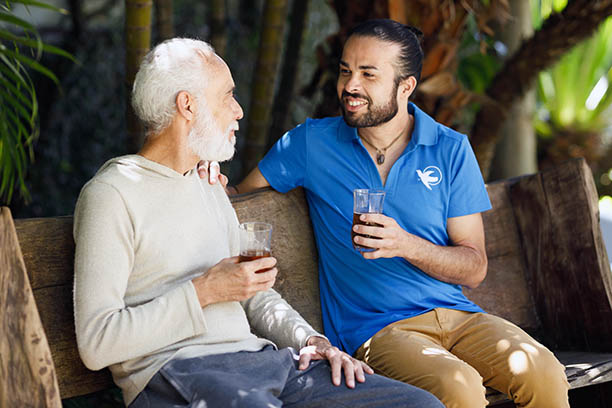
Questions About Alzheimer's Disease
If someone you care about has just been diagnosed with Alzheimer’s disease, it’s completely normal to have a lot of questions. Alzheimer’s is a condition that affects the brain, causing problems with memory, thinking, and behavior. As time goes on, these issues get worse and can make everyday tasks harder to manage.
Alzheimer’s is a progressive disease, which means it gets worse over time. While most people live for about 4 to 8 years after being diagnosed, some can live much longer, even up to 15 or 20 years. It’s also the sixth leading cause of death in the U.S., with around 5.5 million Americans living with the disease. Although it mainly affects people over 65, about 200,000 individuals under 65 are also diagnosed with Early Onset Alzheimer’s.
Let’s take a closer look at some common questions about Alzheimer’s, especially if you’re supporting someone who has been diagnosed.
1. What is the Difference Between Dementia and Alzheimer's Disease?
Dementia is a general term for a group of symptoms that affect memory and thinking. Alzheimer’s is the most common cause of dementia, making up about 60-80% of cases. So, if someone has Alzheimer’s, they have dementia, but not everyone with dementia has Alzheimer’s. Other conditions, like vascular dementia, can cause similar symptoms but are caused by different factors.
2. What are the Risk Factors with Alzheimer's Disease?
We don’t know exactly what causes Alzheimer’s, but there are several factors that can increase the risk. The biggest ones are:
- Age: Most cases develop after age 65.
- Genetics: If Alzheimer’s runs in your family, you may be at higher risk.
- Heart Health: Poor cardiovascular health (like high blood pressure, diabetes, or a history of stroke) can increase the risk.
- Other factors: Smoking, heavy drinking, stress, head injuries, and sleep issues can also raise the chances of developing Alzheimer’s.
3. What are Some of the Symptoms of Alzheimer's Disease?
Early signs of Alzheimer’s can show up in how a person talks, thinks, or behaves. Some of the common symptoms include:
- Forgetting things or mixing up words (this is different from normal age-related forgetfulness)
- Difficulty solving simple problems
- Struggling with everyday tasks
- Losing things more often (again, different from normal forgetfulness)
- Not recognizing familiar people or places
- Getting confused about time, place, or everyday routines
- Becoming irritable, anxious, or depressed
4. How Does the Disease Progress?
Alzheimer’s usually starts slowly and gets worse over time. At first, a person might have mild memory issues, but as it progresses, they could have trouble recognizing loved ones, speaking, or doing basic things like eating or using the bathroom. Understanding how the disease progresses can help you prepare for what’s ahead.
5. Is there a Cure for Alzheimer's Disease?
Unfortunately, there’s no cure for Alzheimer’s yet, and the brain damage it causes is irreversible. While scientists continue to search for a cure, current treatments aim to slow down the disease and manage symptoms. For those at risk or living with Alzheimer’s, doctors often suggest focusing on a healthy lifestyle, especially heart health. Getting good sleep, eating foods rich in omega-3s, and managing stress can also help reduce the risk.
6. What are the Options Going Forward with Alzheimer's Disease?
As Alzheimer’s progresses, your loved one will need more care. In the early and middle stages, family and friends often provide support, but later stages usually require professional care, such as a trained caregiver from Visiting Angels.
You might consider moving your parent or loved elder into a nursing home, but that can be tough for someone with Alzheimer’s, as it can feel confusing or overwhelming. Another option is professional in-home care, which allows your loved one to stay in the comfort of their own home.
Alzheimer’s-specific home care is different from regular home care because it focuses on the unique needs of the disease. Caregivers trained to work with Alzheimer’s patients can provide the right care and support for both the individual and their family.
If you want to learn more about Alzheimer’s care or need help getting started with in-home support, reach out to our agency, Visiting Angels of Liberty Lake.
We make it easy to find the perfect caregiver for your family member or loved one. We serve Spokane County, Newman Lake, Liberty Lake, Green Bluff, Colbert, Mead, Otis Orchards, Chattaroy, Deer Park, Elk and Newport.
When you call Visiting Angels of Liberty Lake, we will set up a complimentary consultation. During the consultation, we will be able to learn the family's needs and then create a custom plan for your loved one. To set up this meeting or to discover more information:
Serving Liberty Lake, Mead, Colbert, Deer Park & Surrounding Areas
Visiting Angels LIBERTY LAKE WA
23801 E Appleway #120Liberty Lake, WA 99019
Phone: 509-903-4000
IHS.FS.61468298


